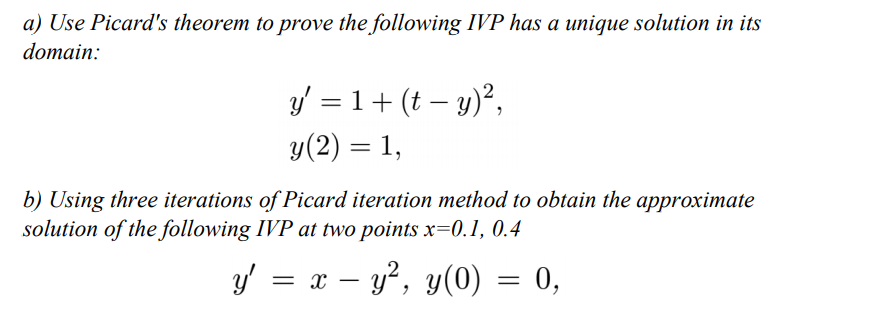a) Use Picard's theorem to prove the following IVP has a unique solution in its domain: y' = 1 + (t - y)², y (2) = 1, b) Using three iterations of Picard iteration method to obtain the approximate solution of the following IVP at two points x=0.1, 0.4 y' - = x − y², y(0) = 0,
a) Use Picard's theorem to prove the following IVP has a unique solution in its domain: y' = 1 + (t - y)², y (2) = 1, b) Using three iterations of Picard iteration method to obtain the approximate solution of the following IVP at two points x=0.1, 0.4 y' - = x − y², y(0) = 0,
Linear Algebra: A Modern Introduction
4th Edition
ISBN:9781285463247
Author:David Poole
Publisher:David Poole
Chapter2: Systems Of Linear Equations
Section2.5: Iterative Methods For Solving Linear Systems
Problem 25EQ
Related questions
Question

Transcribed Image Text:a) Use Picard's theorem to prove the following IVP has a unique solution in its
domain:
y = 1+ (t – y)²,
у(2) 3 1,
b) Using three iterations of Picard iteration method to obtain the approximate
solution of the following IVP at two points x=0.1, 0.4
y'
= x – y?, y(0) = 0,
Expert Solution
This question has been solved!
Explore an expertly crafted, step-by-step solution for a thorough understanding of key concepts.
Step by step
Solved in 2 steps

Recommended textbooks for you

Linear Algebra: A Modern Introduction
Algebra
ISBN:
9781285463247
Author:
David Poole
Publisher:
Cengage Learning

Linear Algebra: A Modern Introduction
Algebra
ISBN:
9781285463247
Author:
David Poole
Publisher:
Cengage Learning